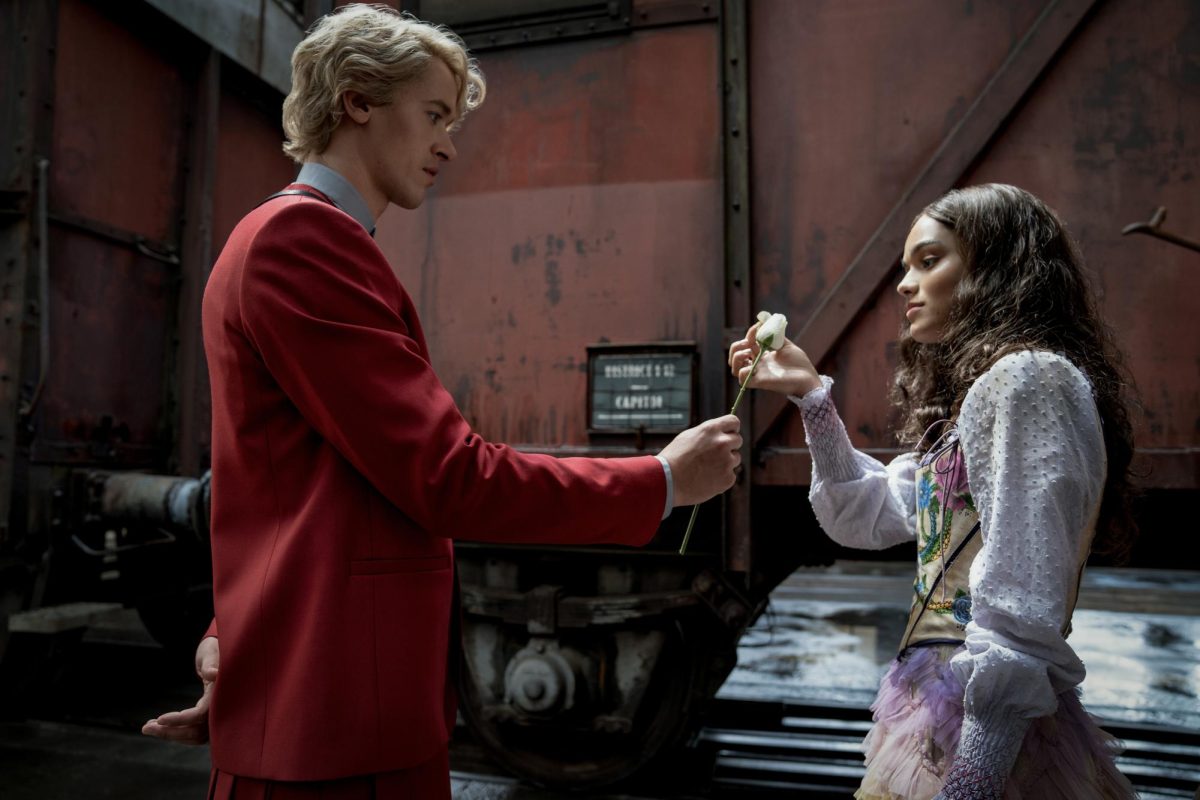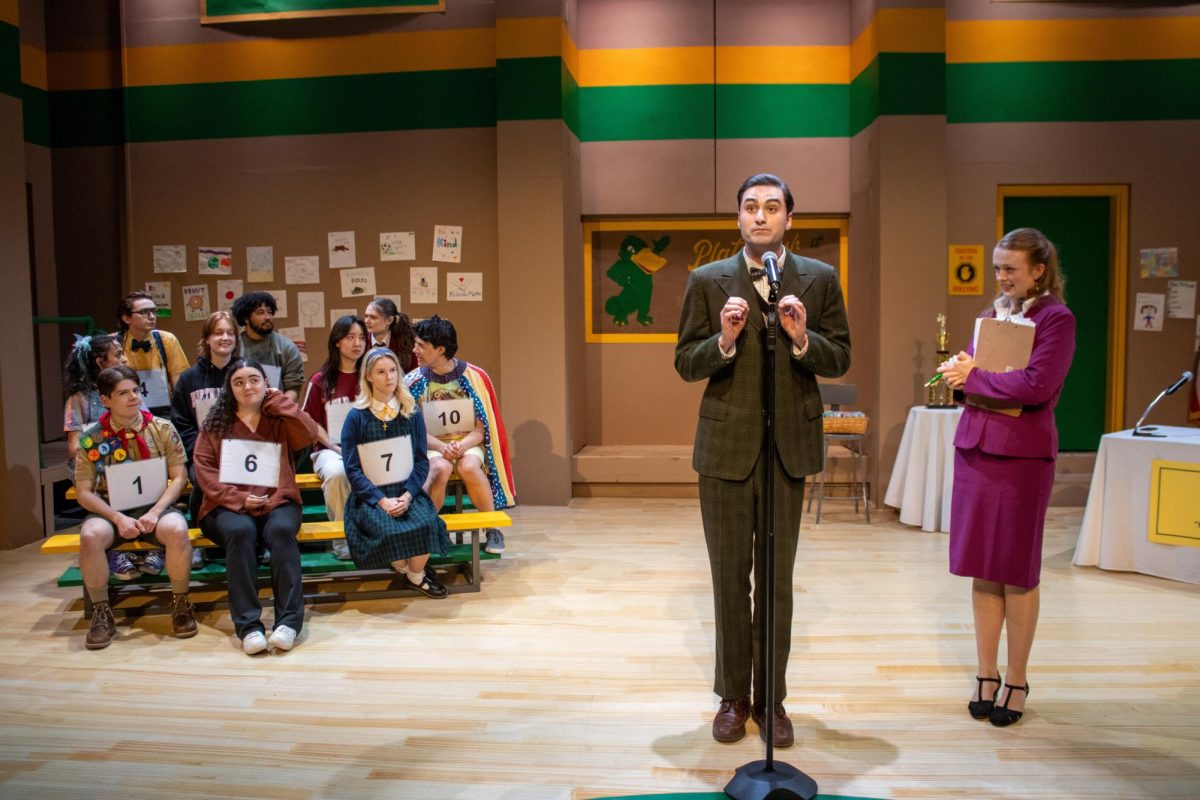It’s a chilly November night, and a group of friends are driving to see the newest “Hunger Games” movie as Taylor Swift’s most recent release, “1989,” is playing through the car speakers. Is this scenario taking place in 2014 or 2023? Both options are correct.
“The Hunger Games: The Ballad of Songbirds and Snakes,” which premiered Nov. 17, returned viewers to the world of Panem, giving them a look at the early days of the Hunger Games and a future dictator’s descent into evil. Nostalgic fans were evidently excited to revisit the franchise, with the film bringing in about $243.6 million at the box office worldwide since its release.
The prequel film, which is set 64 years before the original series, follows a young Coriolanus Snow (Tom Blyth), the future president of Panem, as a Capitol student assigned to mentor Lucy Gray Baird (Rachel Zegler), the female tribute from District 12, for the 10th Hunger Games. As Lucy Gray prepares to enter the arena, Snow must decide how far he is willing to go to get her out alive — and receive the cash prize, which would save his nearly destitute family.
As the film progresses, Snow’s increasing infatuation with power and the shifting motivations behind his actions demonstrate how Snow gradually becomes more evil. When Snow is initially assigned to mentor Lucy Gray, his goal is selfless, as he wants to obtain the prize that would financially save his family. After meeting and becoming enamored with Lucy Gray, however, his motivations become partially self-serving, now working toward saving both his family and his tribute.
In the final third of the film, Snow is solely motivated by self-preservation, betraying the people he loves to, essentially, avoid the consequences of his actions.
The scene where Snow attempts to murder someone close to him to conceal his involvement in a murder (which feels a bit ironic) is when Blyth delivers his strongest performance in the film. It is in this moment that the viewer can tell Snow has shifted into the man that will one day rule Panem with an iron fist, and Blyth’s intense performance screaming and seemingly breaking down leaves viewers stunned and, perhaps, a little afraid.
Zegler’s most powerful performance happens in the arena, where head gamemaker Dr. Volumnia Gaul (Viola Davis) is prepared to let her die — she is the only tribute left alive and at risk of being killed by venomous snakes. In a final show of strength and protest, she sings a song called “The Old Therebefore,” essentially telling Gaul, Snow and the rest of the Capitol she is not ready to die yet — she refuses to. As Zegler belts out the powerful ballad, the audience is left as speechless and moved as the Capitol citizens in the movie.
The film’s commitment to creating a retro-futuristic world is a highlight. Unlike the original series, where the Hunger Games used incredibly advanced technology, such as holograms, genetically engineered “mutts” and vital trackers injected into tributes, technology in the earlier days of Panem is far more archaic and in need of workshopping. The drones are rarely able to successfully deliver supplies to tributes and the televisions and microphones, among other gadgets, look as if they’re from the 1950s.
Additionally, the Capitol citizens wear sophisticated and muted hues, predominantly black and white, instead of the bright and flashy colors present in Katniss Everdeen (Jennifer Lawrence) and Peeta Mellark’s (Josh Hutcherson) era. One of the mentors, Arachne (Lily Cooper), asks if Lucy Gray is a clown upon seeing her rainbow dress. She would’ve hated Effie Trinket (Elizabeth Banks).
The development of a retro-futuristic world through the production and costumes is an important storytelling device, as the progression of technology and clothing in Panem represents how the Hunger Games became more of a spectacle as time went on — the more flamboyant the clothes, the more flamboyant the Games.
Although it takes place decades before Katniss volunteered as tribute in the first film, “The Ballad of Songbirds and Snakes” throws a bone to seasoned fans. From Snow yelling out, “Who will watch the Games if there’s no victor?” (reminiscent of Katniss and Peeta’s willingness to leave the 74th Hunger Games without a victor) to Lucy Gray declaring it was too early to pick the Katniss plant, there were many instances where older fans might’ve felt like Leonardo DiCaprio pointing at a screen in “Once Upon a Time in Hollywood.”
With powerful performances and presentations of why Panem and the Hunger Games are the way they are, “The Hunger Games: The Ballad of Songbirds and Snakes” has proved itself as a worthy fifth installment in a generation-defining series.

















